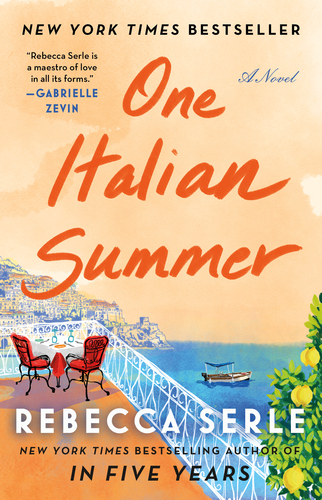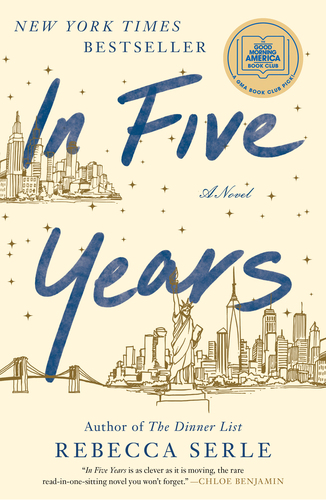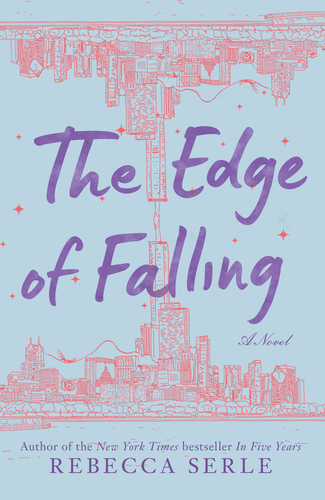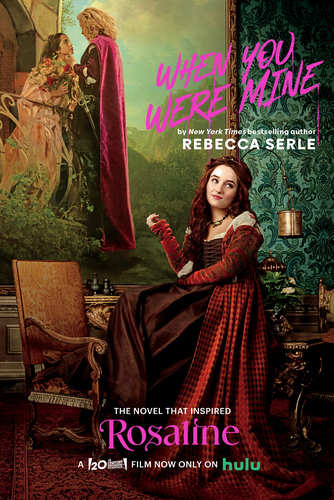Expiration Dates: A Novel (19 page)
Read Expiration Dates: A Novel Online
Authors: Rebecca Serle

To my agent, Erin Malone, without whom I'd have none of this. We surpassed wildest dreams a long time ago and we're still going. I love everything about doing this with you.
To my editor, Lindsay Sagnette, the greatest partner and teammate. Thank you for your blind and unyielding faith in me, my words, and my future.
To my publisher, Libby McGuire, who is simply the best in the business.
To Jon Karp for continuing to make Simon & Schuster such a wonderful home.
To my manager, David Stone, who guides my career with the utmost intelligence, grace, and humility.
To Dana Trocker, for the cold hard facts.
To Ariele Fredman, still, and to Falon Kirbyâthank you.
To Jade Hui, Alexandra Figueroa, Caitlin Mahony, Matilda
Forbes Watson, and Alicia Everett for their support, time, enthusiasm, and compassion.
To Hilary Zaitz Michael and Chelsea Radler for believing these stories deserve to be told in other mediums.
To everyone at WME and Simon & Schuster who work so incredibly hard on behalf of me and my novels. My gratitude is endless.
To Leilani Graham for your keen eye and deep generosity.
To the Wednesday Crew plus Murphy. I cherish our community. Five stars.
To my parents, who are such great gifts in my life.
And to you. I was single for a very long time. When I sat down to write this book, I told my editor: “I want to write about the search for love, and I think if I write it honest, he'll be there at the end of it.” When I finished it, I wrote her: “You know how I write a note at the end of all my books to my readers? This time the note is the novel.” Everything I'd like to say about that incredibly winding journey is in these pages. All of Daphne's chapters matter, just like all of mine did, just like all of yours do.
Incidentally, he was there at the end of it, but that's a story for another timeâ¦

Rebecca Serle
This reading group guide for
Expiration Dates
includes an introduction, discussion questions, ideas for enhancing your book club, and a Q&A with author
Rebecca Serle
. The suggested questions are intended to help your reading group find new and interesting angles and topics for your discussion. We hope that these ideas will enrich your conversation and increase your enjoyment of the book.
Being single is like playing the lottery. There's always the chance that with one piece of paper you could win it all.
Daphne Bell believes the universe has a plan for her. Every time she meets a new man, she receives a slip of paper with his name and a number on itâthe exact amount of time they will be together. The papers told her she'd spend three days with Martin in Paris; five weeks with Noah in San Francisco; and three months with Hugo, her ex-boyfriend turned best friend. Daphne has been receiving the numbered papers for over twenty years, always wondering when there might be one without an expiration. Finally, the night of a blind date at her favorite Los Angeles restaurant, there's only a name: Jake.
But as Jake and Daphne's story unfolds, Daphne finds herself doubting the paper's prediction, and wrestling with what it means to be both committed and truthful. Because Daphne knows things Jake doesn't, information thatâif he found outâwould break his heart.
Told with her signature warmth and insight into matters of the heart, Rebecca Serle has finally set her sights on romantic love. The result is a gripping, emotional, passionate, and (yes) heartbreaking novel about what it means to be single, what it means to find love, and ultimately how we define each of them for ourselves.
Expiration Dates
is The One readers have been waiting for.
- When we first learn about Daphne's slips of paper, she says, “Something else has always called the shots in my lifeâcall it the universe, fate, the comedic force of timing.” How does this set up the conversation about destiny versus choice throughout the novel?
- In chapter 4, Daphne says, “But I still wanted forever love. I still wanted my perfect mate, my smiling husband. I'd picture the white tulle dress and the lace veil and a man who was kind and attractive and who my parents loved, because why not.” How is Daphne's description of her perfect man different at the end of the novel?
- How does the Daphne dating Jake differ from the versions of her with previous men? How does she change over the course of their relationship and for what reasons?
- Hugo is one of the most important people in Daphne's life. How does their relationship change over the course of the novel, and how does Hugo contribute to Daphne's understanding of happiness for herself?
- When Jake asks Daphne to move in with him, what does Daphne's reaction tell us about what this next step in the relationship means for her? What are the factors that make her want to say yes, or say no?
- There's a major twist in the novel regarding Daphne's health. Why do you think the author decided to introduce the twist where she did, and how does it contribute to the larger message of the novel?
- Why do you think Daphne felt she had to keep her health condition and her slips of paper a secret? Why does she ultimately decide to divulge that information?
- In chapter 25, after Hugo, Jake, and Daphne have dinner together, Jake says, “I feel for him, Daphne⦠It's not his fault he's still in love with you.” What was your reaction to that scene?
- Similarly to Daphne, Jake brings his own history and baggage into their relationship. How does Jake's past affect his relationship with Daphne?
- We discover toward the end of the novel that Hugo wrote Jake's note, starting Daphne and Jake's relationship. Why do you think Hugo did what he did, and how does it speak to the core question of destiny versus choice at the heart of the novel?
- Sense of environment is a major theme in many Rebecca Serle novels, and this time she set the novel in Los Angeles. What parts of LA came alive for you, and how was the story enriched by this setting?
- Were you surprised that Jake and Daphne did not end up together? What do you think this means for Daphne's journey and her resolution at the end of the book?
- One of the last lines of the novel reads, “
Goodbye
, I think, although that is not the right word. What I mean is something else, something that is not possible to convey in a singular expression. Something that is not at all an ending.” What do you think Daphne means by this?
- Discuss how you came to find love in your life, how it relates or differs from Daphne's experience, and how the journey to find love looks different for everyone.
- Read
In Five Years
and
One Italian Summer
, and discuss how Rebecca uses magical realism and themes of love (in all forms) in each of her novels. - Visit
rebeccaserle.com
to learn more about the author and the inspiration behind this book.
There is a magical realism element to all of your books, with Daphne's slips of paper in
Expiration Dates
, but also in
One Italian Summer
and
In Five Years
. How does magic allow you to explore your characters and the larger themes you discuss in your books?
Magic is a way into the books that can just cut to the heart of what I'm trying to say faster. You could tell Daphne's story as someone who is a serial dater and who is trying to kind of game the system, game life, but why not just give her a little bit of magic? I like that my protagonists have something other people don't. It allows me to really look at what makes them special.
Daphne dates a revolving door of men throughout the novel, and each has their own distinct personality. How were you able to instill each character with their own deep history? Where did you draw your inspiration from?
Listen, I met my husband when I was almost thirty-seven⦠I come by that revolving door honestly! I know what it feels like to search, and some of the experiences that come along with that, but no one in the book IS anyone I was ever with. They are all facets of Daphne's journey, and what she needs to learn. Some of our lessons were similar, but a lot of them were not. The men all give her something, so it was easy to figure out who they were when I let Daphne lead.
There are beautiful descriptions of Los Angeles throughout the novel. Is there a reason why you chose to set the novel in LA?
Los Angeles is my home now, just like New York was my home for many years. I love LAâand not the LA that people think about when they think about “Hollywood.” Daphne's Los Angeles has a lot of overlap with mine, and I had a lot of fun writing it.
Daphne has a beautiful, endearing relationship with her parents. Why is this dynamic important to her character and the message of the novel as a whole?
Well, I mean, the relationships between adult children and their parents are clearly something I like to talk about! I love my parents and I am very aware, as well, of what it means to grow upâhow a certain part of us has to leave them behind, in a sense. Daphne relies on her parents in ways maybe other thirtysomethings don't. And there's beauty and pain in that. We want our parents to protect us alwaysâbut of course, they can't protect us from life, not really. Part of growing up is realizing that. But alsoâand this is a line in the bookârealizing that “love is a net.” So even if they can't save us, exactly, their love endures.
We see Daphne at different points in her life over the course of the novel. Why did you feel it was important to show the reader who Daphne was when she was coming of age, who she is in the present, and who she becomes months after the ultimate resolution?
I wanted these slips of paper to be something she's lived with forever; they've been with her for a very long time. And when it comes to the search for loveâlisten, it looks different in your twenties than in your thirties. I wanted to represent all of that.
Why is Daphne's heart condition important to her character? How did you hope it would speak to the message of the book?
I knew I wanted to write about the search for love, and then when I came up with this ideaâa woman receives slips of paper that tell her how long her relationships will lastâit felt exciting, but a little bit trite. I couldn't figure out WHY this was her story. When I realized she had a heart condition, everything made sense. None of our time is promised, right? It's the one thing we know for sure: not one of us gets out of here alive. Yet we spend our whole lives trying to run from that one, singular truth. Daphne is no different.
I think we can all agree that Murphy is the cutest dog with the most personality. Why did you decide to include him in the novel?
My dear friend Morgan Matson has a dog named Murphy who shares every single thing in common with Murphy in the book, including his love/fear of bunnies and his big, beautiful heart and dapper personality. Thank you for letting me borrow him, Morgan!
You found true love while writing this novel. Can you speak to that experience, how it contributed to the novel, and vice versa?
I met my husband three months after I finished the first draft. I will say that my love story, when it arrived, felt less like the ending to my single years and more like the start of something else entirely. It's a different conversation.
Expiration Dates
is really about the search. Finding and holding love is a different book.
Can you tell us anything about your next book?
I would imagine that book will take us deeper into commitmentâboth in family and in love. We shall see!



